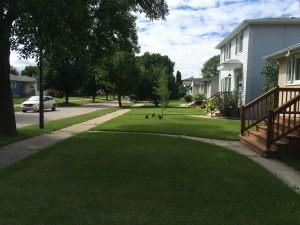 This year, the City of Winnipeg has replaced the use of Malathion, a pesticide known to create toxic byproducts over time, with Deltaguard or deltamethrin. While the city asserts that Deltaguard is a far safer and cost-effective option compared to Malathion, many still call this the “lesser of two evils.”
This year, the City of Winnipeg has replaced the use of Malathion, a pesticide known to create toxic byproducts over time, with Deltaguard or deltamethrin. While the city asserts that Deltaguard is a far safer and cost-effective option compared to Malathion, many still call this the “lesser of two evils.”
Residents in Winnipeg have the option of avoiding the risk of being negatively affected from these chemicals by signing up for a “fogging buffer zone.” Just what is a fogging buffer zone though? Once signed up for the buffer zone, residents can expect that city staff responsible for distributing the fogging will not spray in a defined radius around the property, depending on the buffer zone they have registered with the city.
So why have a buffer zone in the first place? We have a couple reasons why we still recommend signing up for the residential fogging buffer zone:
- Save their natural predators: Deltaguard, like malathion, is an indiscriminate pesticide so it will kill insects that eat mosquitoes such as dragonflies. So, how is it helpful to remove species that would naturally reduce mosquito populations?
- Help rebuild the bee population: Deltaguard is an incredibly persistent pesticide in our environment. Studies have shown that it can persist in water and soil, and has adverse effects on aquatic organisms and bees. There is a decline in bee populations so why worsen the problem?
- Precautionary principle: We don’t know all the potential negative effects it has on our health. Though some long term studies have been performed, there is limited information on how deltamethrin reacts when paired with other poisons, such as insecticides and herbacides.
- To influence City Council: By saying no to deltaguard, this will pressure City Officials to invest in more natural biological alternatives such as breeding dragonflies and rebuilding healthy wetland ecosystems in our city.
- Reduction in effectiveness: Mosquitoes can build resistance to deltamethrin quite quickly, so it eventually will not be as effective.
Do these tips sound familiar? That’s because we gave similar tips several years ago while the city was still using malathion. As with any chemical used for the purpose of killing, these cautions tend to become universal. We think that the environmental and health red flags are enough to consider that it is better to be safe than sorry.
To find out how to register and to receive more information, visit the City of Winnipeg’s Insect Control Branch webpage.



Has the city ever considered a geranium based product that is used around Falcon Lake and Faloma for mosquito control??
I think it’s important to note that Deltaguard is also effective against ticks.
I live in a residential neighborhood in Ottawa and my daughter plus our two neighbours recently contracted Lyme Disease from tick bites – all believed to have occurred in our backyards, which have a public bike and walk path on the other side of our fence.
I wish desperately that Ottawa sprayed public areas with an effective repellent against ticks!!